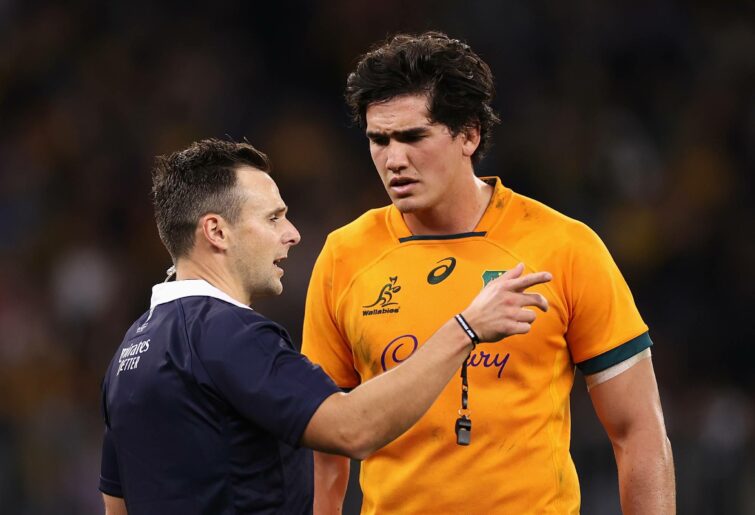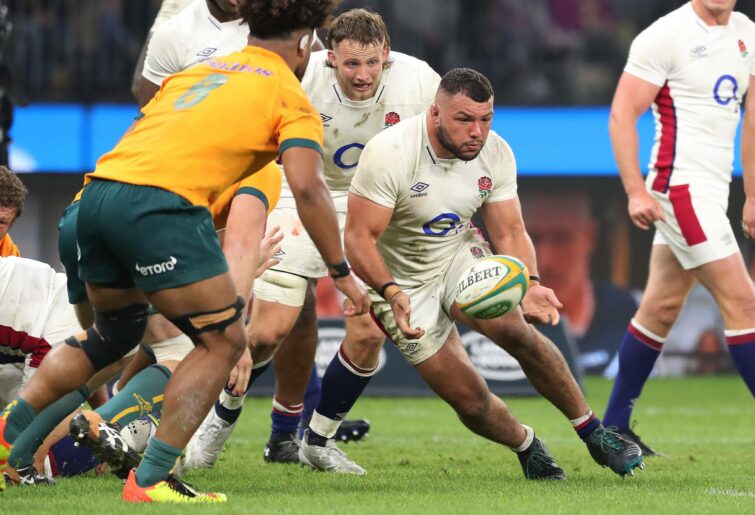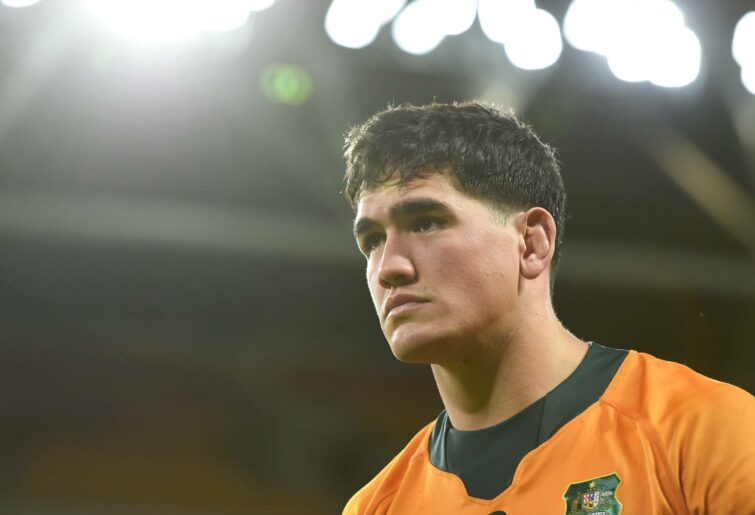Darcy Swain has sad eyes. Jonny Hill has mad eyes.
Darcy’s locks are full and thick. Jonny’s patchwork hair is ready for Mad Max: the Prequel.
Darcy and Jonny are about the same size. Big lads. Probably not bullied much in school: the 6 foot 8 boys who play national Under 20 are not good targets.
But you always find new levels.
Jonny’s older but only has three more caps than Darcy’s ten.
Jonny will play this weekend; Darcy will not. Blame serotonin. Or surprise.
In the first half of the first Test between the Wallabies and England, British and Irish Lion Jonny pushed Queenslander Darcy in the face, with both hands. Not a knockout, but definitely the starting of a fight.
Jonny wanted Darcy to retaliate. He was ready; Darcy was not.
Wallabies coach Dave Rennie had to make a choice under the ‘Giteau Lite’ rule: which three experienced overseas players do you bring back?
With Izack Rodda out, there was a case for bolstering the lock stocks with proven European-based operators like Rory Arnold and Will Skelton. Rennie went with three backs; two of whom starred in the first Test and one pulled up lame in the warmup.
The result is that if one of the Wallabies’ locks is out, the engine room gets bare.
His team needed Darcy to be cool. Find the dopamine. But Darcy was not used to this situation, or so he claims.
Before famously being banned from the rest of the series, Darcy pled his case to the judiciary, asserting (earnestly) that Jonny had “hurt me, deliberately, three times during the game. I have never been treated in the way he treated me in a professional game before, and it hurt, and surprised me, and angered me. He first hit me in the face about 15 minutes earlier. It was forceful, and it hurt. Nothing was done about it, but I kept my cool and did not retaliate.”

Darcy Swain of the Wallabies. (Photo by Cameron Spencer/Getty Images)
The remarkable part of the defense is not the claim that he kept cool after being hit in the face, although in truth Darcy hunted Jonny the rest of the time he was on the pitch with tunnel vision.
The amazing allegation is that a serious wind up had never happened to Darcy before.
Jonny came with intent. To provoke. To find Darcy’s limit. A rookie Wallaby hooker needs his lineout caller clear-headed, but also, on the pitch. For the series, only Matt Philip has more lock caps than Darcy. Jonny had his target and he probed it.
There is an intimacy in rugby, amongst rival packs, unmatched in any sport besides martial arts. The awful and hilarious things we whispered, faces so close, bodies in compromised angles, and most of it hidden forever from the spectator and referee.
After sledging a man about the way the halfback’s slap-slap-slap of the ball before feeding a scrum reminds you of the slap-slap-slap of your balls against, well you know what and who, you can find yourself at the bottom of a ruck staring right into his mother-loving eyes.
I remember telling an opposing Boland flank in three languages, including kitchen-hybrid-creole, which of his family of origin had serviced which of my needs, and even the referee had to stop a scrum to laugh, but I wasn’t laughing when he got my right ear in his teeth later in the match. It still doesn’t look right.
Maul defense is about body height, sure, but it is primarily about domination. As was shown in countless scenes in several documentaries about the Springboks’ winning 2019 World Cup and Lions series campaigns, the Bok coaches and leading players beseeched, implored, and petitioned the forwards to “f—- them up.”
It was that clear.
But being “silent bullies” as Bok prop Trevor Nyakane — he of the long and abrasive tongue—put it ahead of the second Test with Wales, is not a windup. Jonny wanted to find Darcy’s anger.
Again, let’s hear Darcy’s tale:
“Then in the maul immediately before my red card, he struck me in the face again, this time with his elbow. Then, as I tried to avoid that and get the ball, he grabbed a large chunk of my hair, and pulled it forcefully. It hurt, a lot. Unfortunately I didn’t control myself, as I had done earlier. I was angry that he was assaulting me like this, and I wanted him to get the message it wasn’t okay.”
So, the maul in question was a dogfight between Jonny and Darcy. They’d been going around and around for fifteen minutes, but here they were, embraced, arm in arm, and it was time.
Maul Jonny looked like he was enjoying all of it; Darcy’s face was overcast. Both had wayward elbows. But yes, then there was the hair pull. And yes, “it wasn’t okay.” We’re not hairpullers. I mean, that’s lame and lowdown.
A full force clean out in the ribs or an entirely legal ball and all whiplash tackle would have hurt much more, but there is an emotional issue with hair pulling. (I imagine. I have no hair to pull).
The man whose hair is pulled faces a Hegelian dialectic.
Philosopher Georg Hegel broke down the eternal struggle for recognition to an individual level. Two guys run into each other. They both want the other to recognize them as free (or “red-cheeked” and significant).
If one red-cheeked free man pulls another red-cheeked man’s hair, there is more at stake than lost follicles. There is a fight for freedom and hierarchy.

Ellis Genge of England (Photo by Will Russell – RFU/The RFU Collection via Getty Images)
In Hegel’s example, the two men fight, and then they end up fighting to the death. But one surrenders because he prefers life to death. The problem is then the victor forces the victim to obey him and recognize him as master.
That’s an ancient dilemma and it played out in Perth, albeit milder.
So in a way, a hair pull is entirely to be expected of a windup merchant. It is the whole point of all of it. To say: what are you gonna do about it, boy?
Darcy’s excellent (friend of Roar Rugby pod) Aaron Lloyd-led defense, which did shave off a week but not return him to the series, rested on the idea of surprise. Shock. Of not knowing how to react to the unexpected.
Harvard Medical School tried to test the theory of hardwired anger, untaught and instinctual, in lobsters (probably so that the ensuing meals in the faculty lounge were free) and then flies.
How does one feel when facing one’s very first foe? Angry? Frightened? What happens when you are first attacked?
Edward Kravitz, the George Packer Berry Professor of Neurobiology at HMS studies fruit–fly aggression. Kravitz’s research team found during half–hour fights, fruit flies average 27 encounters of 11 seconds each.
The flies move so quickly researchers need slow–motion instant replay to score them. We will call them TFOs.
Kravitz wanted to know what drives this innate aggressive behavior to provide insights into hostility and bullying.
Kravitz found flies show aggressive behaviors when they face competition for resources, such as food or a mate.
At first, they all fight the same way, but over time, winners and losers emerge.
“Losing flies develop a loser mentality,” says Kravitz. They fight less aggressively against opponents they’ve lost to before and, even though they approach new foes with gusto, they tend to keep losing. Even bullies, the victors who keep picking fights and winning, will lose their competitive advantage after just one loss.
Kravitz bred flies with “tunable” aggression: he can selectively turn on and off neurons that contain serotonin and dopamine.
Serotonin is crucial for fight intensity. Without it, flies will not battle with gusto. Dopamine inhibits aggression.
Difficult to balance that in rugby, in a pack, defending home soil.
Darcy: “I pulled him toward me and moved my head forward to try and send him a message. I wasn’t really thinking about it, and wasn’t actually trying to headbutt him. But I accept my head did make contact with the side of his head. I shouldn’t have done it. I’m sorry I did. I was severely provoked in a way I have never seen in elite rugby before, but I know that I shouldn’t have done it.”

(Photo by Getty Images)
I disagree. He is Hegel’s red-cheeked man and did not want to surrender to an attack.
But he chose the wrong way to show the fruit fly he had picked the wrong man to bully.
A slight head butt glancing against the face is entirely the wrong tool.
Jonny needed to be mastered in contact, legally, and full-bore.
It’s a long game, and a long series, with the Wallaby lock stocks low, Darcy could’ve had three hours to plot his revenge.
Dopamine; then serotonin. Not the other way around.
A full force impact by Darcy at top speed followed by the slow standup using Jonny as the lever to rise and soft words of wisdom.
And a beer in the change room at the end of a 3-0 sweep, eye to eye with Jonny, laughing about it all, but with a “let’s go again” air.
That’s the way you wind up a wind up artist.































































































